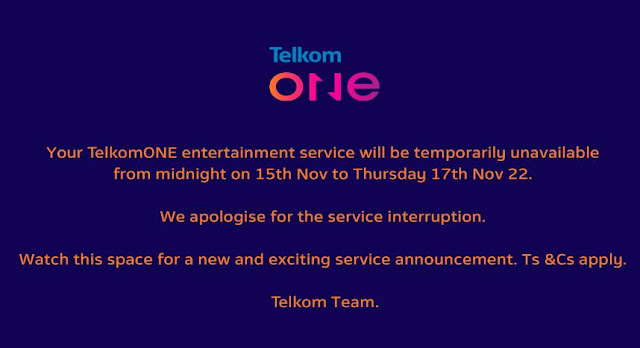by Thinus Ferreira
It might be a case of third time lucky for Telkom which plans to once again compete with MultiChoice's DStv by creating a curated, bundled video streaming offering through a "content mall" that's cheaper than subscribing to streamers directly, after attempts over the past decade to create its own satellite TV service and then its own streaming service both failed.
Lunga Siyo, Telkom consumer CEO, told the ITWeb On The Road podcast that the telecom is busy setting up its own "content mall" through which it wants to bundle various video streaming services at a bundled price that's cheaper that subscribing to each streamer individually.
Multiple American studios and streamers are currently exploring and working on the same idea of offering bundled streaming services similar to the traditional satellite pay-TV bundle, as the industry starts to consolidate and consumers are saying they no longer want to pay for a bunch of different streamers.
In this Telkom "content mall", Telkom customers would be able to subscribe to streamers like Netflix, Amazon Prime Video, Disney+ and others at a cheaper price than subscribing to those streaming services directly.
"Instead of investing in content and becoming a content producer, we've taken a position that we create a content mall. So we become the access. So in our own platform you're able to subscribe to these platforms, for a fee, which might be cheaper than if you were to go directly."
"So we will aggregate all of these services, and offer it you it to you as a bundle," Siyo said.
"They bring their own content, we bring our own platform."
Telkom's latest plan might be easier said than done.
Not only has MultiChoice stalled in its own plan three years after announcing that it was creating a "one-stop shop" for streaming services through its DStv platform, but Telkom has struggled and gave up on both its previous tries to create a traditional and streaming video service.
In 2006 Telkom was one of the few successful bidders for new satellite TV service licences in South Africa and set up Telkom Media into which hundreds of millions of rand was poured with executives appointed and international content agreement signed.
After planning to invest over R7 billion, Telkom then abruptly decided to pivot Telkom Media which never launched, into an IPTV service instead of traditional satellite pay-TV and, two years later in 2008 slashed its funding.
After another year, Telkom dumped Telkom Media in 2009 which was sold off to Shenzhen Media Group which never launched and shuttered.
In November 2020 Telkom tried for a second time with launching its own video service when TelkomONE was launched into which Telkom again poured hundreds of millions of rand.
Barely two years later in November 2022 Telkom decided to get rid of TelkomONE and abruptly shuttered it and sold it off to the SABC for the South African public broadcaster to create its SABC+ streamer.
Streaming bundling future
MultiChoice had the same idea as Telkom a few years ago but MultiChoice's attempt has not fully come to fruition - although in America studios, broadcasters and video service providers are realising they need to aggregate streamers and are trying to come up with new consumer bundling approaches and offerings.
Calvo Mawela, MultiChoice CEO, in 2021 said the traditional satellite pay-TV service would work to become a "one-stop shop" and a "super aggregator" for video entertainment services like streamers.
Over the past three years MultiChoice has added third-party streaming apps through DStv like Netflix, Disney+, Amazon Prime Video and the recently shuttered BritBox but that's where its efforts stalled.
Warner Bros. Discovery's Max isn't available in South Africa yet, and Paramount added its Paramount+ not as a stand-alone streamer in South Africa like elsewhere in the world but as a studio tile folded for free into MultiChoice's own Showmax streamer with a limited Paramount+ title offering.
Other global streamers like Apple TV+ and local streaming services are also not available on, or through DStv.
In the United States, consumers who have had to subscribe to four or five different streaming services are cutting back as streamers from Netflix to Disney+ are aggressively hiking subscription fees, adding ads, and making it much more expensive to be a subscriber than when they launched.
Media companies, legacy pay-TV services and content providers like Disney are trying to figure out how to offer bundled streaming services where they don't cannibalise other offerings but provide consumer value in a way where they can drive sustained subscriber growth and profitability, while it also makes sense as a bundle.
Earlier this year Warner Bros. Discovery, Disney with its ESPN and Fox announced they would start a joint sports streaming service Venu which has quickly become mired in a court battle.













